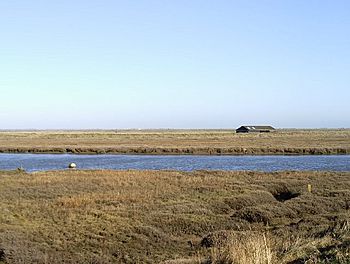Rushley Island facts for kids

A view of Rushley Island
|
|
| Geography | |
|---|---|
| Location | Essex, England, United Kingdom |
| Coordinates | 51°33′58″N 0°49′52″E / 51.565977°N 0.831162°E |
| Demographics | |
| Population | Uninhabited |
Rushley Island is a small, quiet island in Essex, England. It's not a place where people live, making it a true uninhabited island. This island is the smallest of six islands found in an archipelago (a group of islands) in Essex. It's also privately owned, meaning it belongs to an individual or a family, not the public.
People started building a seawall on Rushley Island way back in the 1780s. A man named John Harriott was responsible for this important construction. Since then, the island has been used for farming activities, showing its long history with agriculture.
Contents
The Rushley Island Racehorse
A Horse Named After the Island
Did you know there was once a racehorse named after Rushley Island? A local horse trainer, Frank Threadgold, owned the island for a time. He decided to name one of his horses "Rushley Island" after his property.
Her Early Life and Races
This special horse was a bay mare, meaning she had a reddish-brown coat. She was born in 1976. Her parents were also racehorses named Crooner and Vicki Ann. Later, she was trained at the famous Newmarket track by Mr. H. C. Westbrook.
As a two-year-old in 1978, Rushley Island entered four races. These races took place between September and November at Yarmouth, Lingfield (twice), and Doncaster. Most of these races were about six furlongs long (which is about 1,200 meters).
Her Racing and Breeding Career
Unfortunately, Rushley Island wasn't a very successful racehorse. In all her races, she finished near the very end, usually second from last. Because of this, she was retired from racing.
After her racing career, she went back to the Threadgold family in Southend-on-Sea for breeding. The Threadgold family has been farming land nearby since the 1930s. Sadly, she didn't have much luck with breeding either. She did have one male foal, a bay colt named Tudor Rhythm, in 1980. However, Tudor Rhythm never raced. By 1987, Rushley Island was officially retired from breeding and her story ended in the record books.

